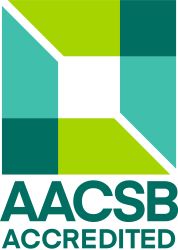Binghamton University's School of Management is a top-ranked school that attracts remarkable students from across the world who invest in a world-class education for an incredible value.
As innovators in business education, we're committed to continuously adapting to address the needs of our students and industries we serve.
We help our students grow by tackling new challenges, developing competitive skills and building lifelong connections while finding their place in the evolving business world.
Explore SOM
- Faculty Directory
- Staff Directory
- Doctoral Student Directory
- Request Undergraduate Program Information
Meet Some of Our Faculty
Dan McKeever - Assistant Professor of Finance
Chou-Yu Tsai - Osterhout Associate Professor of Entrepreneurship
Be Part of SOM's Growing Network
Find out how SOM alumni can stay connected and bring it back to Binghamton by working with our Constituent Relations Office!
Accreditation
The Binghamton University School of Management has been accredited by AACSB, the Association to Advance Collegiate Schools of Business, since 1976. AACSB is considered the highest standard of achievement for business schools worldwide. Attending an AACSB accredited business school means you are part of a program committed to continuous improvement, strategic management and innovation, learner success, thought leadership, and societal impact.
Every five years, AACSB conducts a “Continuous Improvement Review” to extend the accreditation of an institution. The process includes a peer review from other accredited business schools in addition to final approval from the Board of Directors.
Employers recognize that graduates of AACSB-accredited schools are some of the most highly skilled, and the SOM is proud to have this distinction.


Shelley D. Dionne
Dean and Professor of Management
Follow us!
Mailing Address
School of Management
Binghamton University
Academic A Building
PO Box 6000
Binghamton, NY 13902-6000
Visit Us
Main Office: Academic A Suite 120
Schedule a Visit
View Campus Map
Visitor Parking Information